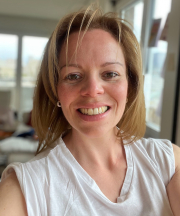An interview with Caroline Hyde-Simon by Vicky Papageorgiou
First of all, I would like to thank you for agreeing to give this interview and I would also like to welcome you! For people who might not know you, you are the coordinator of IATEFL’s ESPSIG. Can you please share some details about your professional background?
I work as Lecturer in English at the Zurich University of Applied Sciences in Zurich, Switzerland, a position I have held since 2012. My main work is in the School of Life Sciences and Facility Management, where I teach with a specific focus on EAP and ESP.
EAP has developed significantly as a field over the past few years and now it seems it will change even more. How do you feel AI will affect EAP overall?
I think the question of AI is one that is at the forefront of everyone’s minds at the moment working in the field of education. The question really should be considered from two perspectives: positive impacts, and challenges and ethical concerns. Many aspects of the more positive perspective have the potential to affect all areas of the learning process, e.g. personalised learning, assessment, language resources, accessibility, and even content creation. The one area I feel is more specific to EAP is that of Academic writing assistance, particularly the availability of feedback on cohesion, clarity and coherence, three absolutely crucial elements of
the academic writing process. On the other hand, students often now will rely on AI to produce an academic piece of work, and then will be uncertain, or not bother to check, on the quality of the content produced. As we all know, the writer needs a deep awareness of what the output should look like, and the danger of over-reliance on AI is that this step will become lost. The danger of a lack of critical thinking skills is thus a very real one, and I therefore believe that EAP/ESP courses should henceforth focus more on the process of producing a piece of academic work, rather than assessing the final output.
Regarding the SIG, what are the challenges you have faced since you were appointed to this position? How did you manage to overcome them?
One of the main challenges I have come across is being in a position of having to manage both a group of people and a great many tasks without being seen in a superior position, which of course is not the case as coordinator of a SIG. I think it is often the case that committee members look to you as the person having all the answers, which again is not (always) true, and, at least for me, I have found the need to turn to head office for advice often. Another challenge is having to be involved in, and try to resolve, conflict, particularly when your own background is not one which includes a managerial role.
How do you see the SIG in the future? What are your short-/long-term goals?
We now have a new position on our committee, that of Outreach Officer. Our goal in this regard is to access the four corners of the Earth, in particular those in which we have not had, to date, as many contacts and members as we could have. Additionally, following the pandemic, we are starting to arrange face-to-face conferences once again, as we feel our members benefit greatly from the networking and professional exchange opportunities these afford. In fact, we are in the process of working on 2 upcoming face-to-face events, so watch this space... On a more short-term basis, we are always looking to gain more members for
our SIG, as well as committed committee members, so please do get in touch if you would like to join us!
If you could start as IATEFL ESPSIG’s coordinator over again, what would you do differently?
I would assert myself to a greater extent, albeit gently, right from the beginning, and trust that I am acting in the best interests of the SIG and the committee members as well as, of course, our members. Further, time allowing of course: I would try and invest more time in team building activities and developing strategies for conflict resolution as a group. Finally, particularly important when working with people with different cultural backgrounds, I believe, is the necessity to establish a culture of regular feedback, providing constructive feedback to team members and being open to receiving feedback as well. Continuous improvement is essential.
Thank you so much for your time, Caroline!
About Caroline
Caroline has been teaching EAP/ESP at the Zurich University of Applied Sciences in Zurich, Switzerland, since completing her PhD in Applied Linguistics Research Methodology in 2012. She started in the School of Engineering and has since moved to the School of Life Sciences and Facility Management where she teaches primarily students studying for their bachelor’s degree. Her current research interests include blended learning in ESP/EAP, and the development of critical thinking in the context of AI in the academic arena.
Contribute to the blog
If you are a member of IATEFL and would like to contribute to the blog, we’d love to hear from you at [email protected]. We’re looking for stories from our members, news about projects you’ve been involved in, and anything else you think those connected to English language teaching would be interested in reading. We look forward to hearing from you! If you’re not a member, why not join us?

